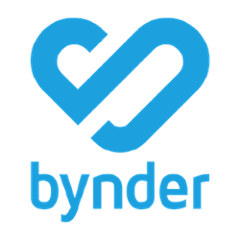Bynder Java SDK
The main goal of this SDK is to speed up the integration of Bynder customers who use Java, making it easier to connect to the Bynder API (http://docs.bynder.apiary.io/) and executing requests on it.
Current status
At the moment this SDK provides a default library with the following methods:
Bynder Service
OAuthService getOAuthService();
AssetService getAssetService();
CollectionService getCollectionService();
Observable<Response<List<Derivative>>> getDerivatives();
OAuth Service
URL getAuthorizationUrl(final String state);
Observable<Token> getAccessToken(final String code);
Observable<Token> refreshAccessToken();
Asset Bank Service
Observable<Response<List<Brand>>> getBrands();
Observable<Response<List<Tag>>> getTags();
Observable<Response<Map<String, Metaproperty>>> getMetaproperties(MetapropertyQuery metapropertyQuery);
Observable<Response<List<Media>>> getMediaList(MediaQuery mediaQuery);
Observable<Response<Media>> getMediaInfo(MediaInfoQuery mediaInfoQuery);
Observable<Response<Void>> modifyMedia(MediaPropertiesQuery mediaPropertiesQuery);
Observable<Response<Void>> deleteMedia(MediaDeleteQuery mediaDeleteQuery);
Observable<Response<DownloadUrl>> getMediaDownloadUrl(MediaDownloadQuery mediaDownloadQuery);
Observable<Response<Usage>> createUsage(UsageCreateQuery usageCreateQuery);
Observable<Response<List<Usage>>> getUsage(UsageQuery usageQuery);
Observable<Response<Void>> deleteUsage(UsageDeleteQuery usageDeleteQuery);
Observable<Response<List<Smartfilter>>> getSmartfilters();
Observable<SaveMediaResponse> uploadFile(UploadQuery uploadQuery);
Observable<UploadProgress> uploadFileWithProgress(UploadQuery uploadQuery);
Collection Service
Observable<Response<List<Collection>>> getCollections(CollectionQuery collectionQuery);
Observable<Response<Collection>> getCollectionInfo(CollectionInfoQuery collectionInfoQuery);
Observable<Response<Void>> createCollection(CollectionCreateQuery collectionCreateQuery);
Observable<Response<Void>> deleteCollection(CollectionInfoQuery collectionInfoQuery);
Observable<Response<List<String>>> getCollectionMediaIds(CollectionInfoQuery collectionInfoQuery);
Observable<Response<Void>> addMediaToCollection(CollectionAddMediaQuery collectionAddMediaQuery);
Observable<Response<Void>> removeMediaFromCollection(CollectionRemoveMediaQuery collectionRemoveMediaQuery);
Observable<Response<Void>> shareCollection(CollectionShareQuery collectionShareQuery);
Installation
Using latest release
The most recent release is Bynder Java SDK 2.2.7.
To add a dependency on the SDK using Maven, use the following:
<dependency>
<groupId>com.bynder</groupId>
<artifactId>bynder-java-sdk</artifactId>
<version>2.2.7</version>
</dependency>
To add a dependency using Gradle:
dependencies {
implementation 'com.bynder:bynder-java-sdk:2.2.7'
}
Using source code
Components used to install and run the project:
- Java version 1.8.0_221
- Apache Maven 3.6.0
Important: Don't forget to define the environment variables for Java and Maven!
Clone the repository:
$ git clone git@github.com:Bynder/bynder-java-sdk.git
Build the project from its root with the following Maven command (skipping the GPG signing and Javadocs generation):
$ mvn clean install -Dgpg.skip -Dmaven.javadoc.skip
This command tells Maven to build all the modules and to install it in the local repository. At this point all the integrations tests will be skipped.
Using ProGuard
If you are using ProGuard, remember to add the following lines to your ProGuard rules file.
# Bynder Java SDK
-keep class com.bynder.sdk.model.** { *; }
-keep class com.bynder.sdk.query.** { *; }
How does it work
Before executing any request to the Bynder API, it is necessary to instantiate the class BynderClient.
The following examples show how to use the BynderClient.Builder.create(final Configuration configuration) static method to create an instance of the BynderClient using the Configuration object as parameter.
Instantiate BynderClient with a Permanent Token
BynderClient bynderClient = BynderClient.Builder.create(new Configuration.Builder("Bynder portal base URL").setPermanentToken("Permanent token")).build());
Instantiate BynderClient with a OAuth application settings
BynderClient bynderClient = BynderClient.Builder.create(new Configuration.Builder("Bynder portal base URL").setOAuthSettings("Client id", "Client secret", "Redirect URI")).build());
After instantiating the BynderClient class successfully with your OAuth application settings the OAuth flow needs to be executed, using the methods from the OAuthService, in order to authorize the SDK client with Bynder and get an access token to perform the API requests.
To check how to execute the OAuth flow, please see AppSample.java.
After the SDK client had been authorized successfully it is possible to call any of the methods listed in the section Current Status. Example:
Reactive way to get the Observable
// Get an instance of the asset bank service to perform Bynder Asset Bank operations.
AssetService assetService = bynderClient.getAssetService();
// Get all tags (request without query)
Observable<Response<List<Tag>>> tagsObservable = assetService.getTags();
// Get media (request with query)
Observable<Response<List<Media>>> mediaObservable = assetService.getMediaList(new MediaQuery().setType(MediaType.IMAGE).setLimit(100).setPage(1));
Synchronous way to wait for the Observable to complete and emit the single item
// Get an instance of the asset bank service to perform Bynder Asset Bank operations.
AssetService assetService = bynderClient.getAssetBankService();
// Get all tags (request without query)
Response<List<Tag>> tagsResponse = assetService.getTags().blockingSingle();
// Get media (request with query)
Response<List<Media>> mediaResponse = assetService.getMediaList(new MediaQuery().setType(MediaType.IMAGE).setLimit(100).setPage(1)).blockingSingle();

